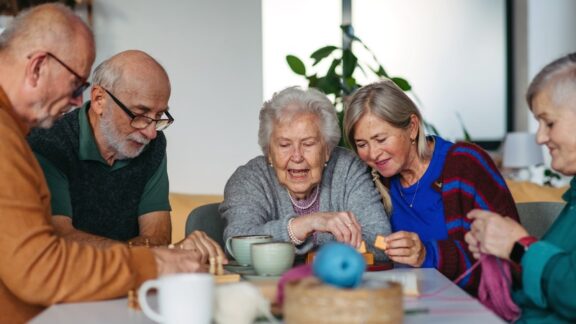During illness and recovery, online care coordination platforms can help people share health updates and coordinate support such as meal trains. Seniors Guide looks at several platforms that help loved ones stay connected and informed. Whether a senior is living independently or in a community, these tools can be invaluable for seniors and their families.
When someone falls ill or begins a long-term recovery journey, friends and family often want to stay informed on news and pitch in to help – but coordinating updates, meals, rides, and emotional support can quickly become overwhelming. Fortunately, there are now several online tools that make it easier to stay in touch, share news, and organize help without making many phone calls or sending many group texts.
These online care coordination platforms let people such as caregivers and family members post updates about the person’s health, schedule visits, and request help with meals, transportation, or errands. Many also include privacy controls and user-friendly designs, making them ideal for seniors or family members managing communication for someone in a senior-living or independent-living setting.
Five recommended online care coordination platforms
Below are five of the most trusted and widely used options available today.
1. CaringBridge – Focus on health updates and emotional support
Website: www.caringbridge.org
One of the oldest and most trusted places to share your health journey is CaringBridge. People can make a private journal on the site to share updates, photos, and important events. Family and friends can stay up to date, leave encouraging comments, and even send virtual hearts or messages of support.
CaringBridge differs from social media in that it doesn’t show ads and is only for health communication. Privacy settings let users choose who can see or edit the page, making it a safe, private space. For people who need help paying for medical or caregiving costs, the site also works with GoFundMe, an established donation platform.
Why it works well for older people: It is easy to use for those not accustomed to social media, thanks to its simple layout and email update feature. It’s an excellent choice for communities where people live on their own and families want to keep everyone up to date without sharing too much information with the public.
2.LotsAHelpingHands – Focus on organizing practical support
Website: www.lotsahelpinghands.com
LotsAHelpingHands is a way to keep track of caregiving tasks. People can form a “community” around the person in need, and volunteers can sign up to bring them meals, drive them to appointments, or visit them for company. The platform automatically sends reminders and updates, making it easier to coordinate multiple helpers.
It also includes a message board and photo sharing, allowing members to stay emotionally connected. The platform is free and emphasizes privacy – only invited individuals can access the community page.
Why it’s great for senior living: Many independent– and assisted-living communities already use LotsAHelpingHands to coordinate volunteer groups and family schedules. It’s beneficial for older adults who manage multiple caregivers, or for neighbors who want to help in structured ways.
3. Meal Train – Focus on meal coordination
Website: www.mealtrain.com
 Meal Train is all about one of the most common ways people help sick friends and family: by bringing them food. Users can set up a schedule that includes their meal preferences, delivery times, and dietary restrictions. People sign up for available dates to avoid duplication and ensure they get consistent support.
Meal Train is all about one of the most common ways people help sick friends and family: by bringing them food. Users can set up a schedule that includes their meal preferences, delivery times, and dietary restrictions. People sign up for available dates to avoid duplication and ensure they get consistent support.
There is also a “Meal Train Plus” option on the site that adds rides, childcare, or errands to the list of tasks. It’s easy to understand, looks good, and is excellent for families dealing with short-term recoveries or long-term illnesses.
Why it suits seniors: It’s an excellent option for residents in independent-living communities who may not need full-time assistance but appreciate coordinated meal deliveries during recovery. The interface is straightforward and easily managed by family members on the patient’s behalf.
4. Give InKind – Best all-in-one support platform
Website: www.giveinkind.com
Give InKind offers a more modern, flexible alternative that combines elements of CaringBridge and Meal Train. Users can post updates, create wish lists (including items from online retailers), coordinate meal deliveries, and manage a calendar for visits or errands. It even allows contributors to send digital gift cards for groceries, takeout, or home services.
Give InKind pages can be public or private, and they include an optional fundraising component. The platform’s clean design and mobile-friendly interface make it ideal for families who prefer everything in one place.
Why it’s ideal for senior care settings: For adult children managing care remotely, Give InKind streamlines communication and logistics. It’s beneficial when multiple siblings or caregivers are sharing responsibilities for a parent in independent or assisted living.
5. CareCalendar – Focus on simplicity and low-tech users
Website: www.carecalendar.org
CareCalendar is another online care coordination platform that has been around for a long time and focuses on managing volunteers and making practical schedules. It’s less visually polished than newer sites, but highly functional. Users can set up tasks such as meals, rides, or home visits and allow others to sign up directly. The site can even generate printable calendars – a helpful feature for those who prefer paper copies or have limited internet access.
It’s free and supported by donations, with a straightforward interface that works well on both computers and tablets.
Why it works for seniors: CareCalendar’s minimalist design and print options make it accessible to users in senior living settings who may not be tech-savvy. Community staff or family members can easily manage it on behalf of residents.
Find tips and guidelines for sharing news publicly on Seniors Guide at Sharing an Illness on Social Media
Recommended platforms for senior-living or independent-living communities
For seniors and their families, the best platforms tend to be those that balance simplicity, privacy, and coordination features:
- Focus on updates: CaringBridge – The email-based notifications and intuitive layout are ideal for keeping extended family informed without overwhelming older adults.
- Focus on organizing help: LotsAHelpingHands – Great for mobilizing neighbors, volunteers, or fellow residents in a senior living community.
- Focus on simple scheduling: CareCalendar – Recommended for seniors who prefer straightforward, low-tech tools.
In practice, many families use more than one platform – for example, CaringBridge for updates and Meal Train for meals – to meet different needs.
Final thoughts
When illness strikes, one of the most meaningful gifts we can give is clear communication and organized support. Whether it’s sharing progress updates, coordinating meals, or scheduling visits, these platforms make caregiving and community involvement easier.
For seniors, especially those living independently or in retirement communities, using online care coordination tools like CaringBridge or LotsAHelpingHands helps maintain dignity and connection – ensuring that no one faces illness alone.




